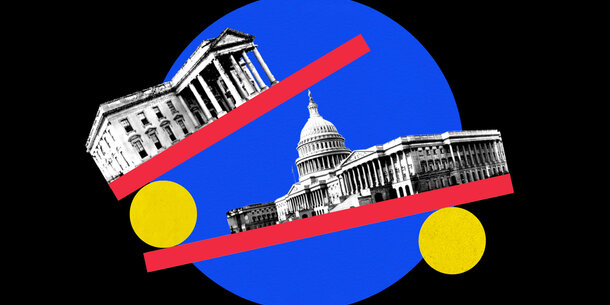UPDATE: On June 21, the Senate parliamentarian ruled that this provision should not be included in the budget reconciliation bill, and it was subsequently removed.
Buried in the House’s budget reconciliation bill — now pending in the Senate — is a legislative provision that takes aim at the federal judiciary. Section 70302, titled “Restriction on Enforcement,” would undermine federal judges’ authority to enforce court orders by limiting their ability to hold government officials in contempt, a key tool for compelling compliance with court orders.
Following court rulings is not optional. If federal officials defy a court order, judges have the authority to hold them in contempt, which is a power that judges exercise to address threats to the integrity of judicial proceedings. When officials fail to follow a court order, judges may hold them and their attorneys in civil contempt, imposing fines, jail time, or other penalties to induce compliance. Judges can also punish past disobedience by holding government officials and their attorneys in criminal contempt.
Section 70302 would forbid federal courts from issuing such contempt penalties against anyone who disobeys preliminary injunctions or temporary restraining orders if the party seeking the order did not put down “security,” a financial guarantee such as a cash bond that would cover damages if a party is found to have been wrongfully enjoined.
Without contempt penalties against officials, judges would be left with few options to induce the government to follow their orders.
The timing of this brazen assault on the rule of law is no coincidence. So far this year, more than 190 court rulings have temporarily or permanently halted administration actions, and several judges have found that the administration violated court orders. At least one judge has found probable cause to hold administration officials in criminal contempt for “willful disobedience.”
Now the president’s allies in Congress are trying to aid these violations by removing potential consequences for such unlawful behavior.
The Senate should remove Section 70302 from the reconciliation bill so judges have the tools they need to ensure that the executive branch abides by the Constitution and the very laws that Congress passes.
The Provision Would Undercut Courts’ Inherent Power to Enforce Their Orders
Federal courts have relied on the contempt power since the founding. Rooted in courts’ innate power to enforce their rulings, the contempt authority was first codified in the Judiciary Act of 1789 and remains good law today. The Supreme Court has described the contempt power as “inherent in all courts” and “essential” to the enforcement of judgments.
It is common for judges to weigh contempt proceedings against federal officials. One study found that between 1990 and 2018 there were over 1,400 district court cases featuring a contempt motion or proceedings against a federal agency. And while often the threat of contempt suffices to induce compliance, judges do sometimes issue sanctions against the federal government. Federal agencies and high-ranking officials from both parties, including the attorney general and other cabinet secretaries, have been held in contempt.
By forbidding judges from punishing those who disobey preliminary injunctions and temporary restraining orders unless the party seeking the order posts security, Section 70302 erodes this cornerstone of judicial authority, inviting defiance of court orders.
The Provision’s Retroactivity Would Undermine Existing Orders and Disrupt Court Dockets
Congress does not often pass legislation that applies to past conduct. However, Section 70302 would apply retroactively, rendering past injunctions issued by federal judges that did not require a bond largely unenforceable absent further action by both the court and the parties in the case.
This retroactive application of Section 70302 would upend rulings by federal courts in countless federal cases across the country — and not just for lawsuits against the government. Any defendant who is subject to a federal preliminary injunction or temporary restraining order in which no bond was ordered would be able to disobey these past orders without the risk of contempt penalties.
In the case of preliminary injunctions, which are used to avoid irreparable harm while a lawsuit is pending, such orders can be in place for years. Limiting these orders’ enforceability risks chaotic disruptions for parties who rely on them to protect their rights and legal interests, and the prospect is especially troubling given the administration’s actions to avoid judicial oversight.
To the extent that Section 70302’s language applies to both preliminary and permanent injunctions — one potential interpretation of this poorly drafted provision — it would have the radical result of effectively preventing courts from enforcing every federal injunction currently restraining the government and private individuals in cases where no bond was posted.
To restore courts’ ability to use their contempt power, judges in each of these individual cases would likely need to reconvene court and order the plaintiffs to post a bond. Given the high case loads and scheduling backlogs that federal courts already face, the resulting burden on both judges and parties would be substantial. Further, there is no guarantee that all judges would act expeditiously in this way, if at all.
Requiring Financial Bonds Would Deter Public Interest Litigation
Under Rule 65(c) of the Federal Rules of Civil Procedure, parties that win preliminary injunctions or temporary restraining orders are required to post a bond in an amount that the court considers proper to cover anticipated cost and damages of the litigation. However, judges have broad discretion over bond requirements, and they routinely choose to waive the requirement or set a low bond amount.
Waivers are an especially common practice in public interest cases against the federal government involving everything from voting rights to freedom of speech. In such lawsuits, courts have strong interests in ensuring that monetary requirements do not impede vindication of constitutional rights and public access to judicial review.
Despite the fact that federal courts already have numerous tools at their disposal to deter frivolous litigation, including sanctions, President Trump issued a memo in March instructing agency heads to demand bonds from plaintiffs requesting injunctions against the federal government to “stop[] judicial overreach and frivolous lawsuits.” Since then, the Department of Justice has asked courts to set exorbitant bonds, even millions of dollars in some cases. Courts have thus far denied these requests, acknowledging that a costly upfront security was inappropriate and would essentially forestall judicial review.
While Section 70302 does not appear to preclude judges from requiring nominal bonds, the provision may still pressure judges concerned about their contempt power to impose sizeable bonds to avoid litigation over the suitability of the amount, even if in their judgment such a large bond amount is unwarranted. As a result, advocacy organizations without deep pockets might think twice before bringing vital public interest litigation and, in some cases, be deterred from bringing such litigation altogether.
Congress Cannot Use Budget Reconciliation to Change Judges’ Ability to Enforce Orders
The budget reconciliation process provides an expedited path for Congress to take up legislation related to taxing, spending, and the national debt. Under this process, reconciliation bills are not subject to a 60-vote threshold for ending debate in the Senate. Instead, they move forward to final passage under a simple majority vote.
However, each provision in a budget reconciliation bill must primarily affect federal spending or revenue and cannot be “extraneous” — defined as a provision whose budgetary effects are “merely incidental to the non-budgetary components of the provision.” Based on Congress’s own rules under the Congressional Budget Act, Section 70302 appears extraneous and should not pass Senate muster for budget reconciliation.
Indeed, Section 70302 is only incidentally related to federal spending and instead constitutes a change to the federal statute governing courts’ contempt powers. The section also alters the Federal Rules of Civil Procedure by overriding courts’ longstanding interpretation of Rule 65(c), which allows judges to waive bonds before issuing a preliminary injunction or temporary restraining order. There is no clear exception in the Congressional Budget Act allowing Congress to impose changes to the contempt statute or the Federal Rules of Civil Procedure via budget reconciliation. If Congress wishes to alter judges’ authority to enforce contempt citations and waive bonds, it should do so via the ordinary legislative process.
• • •
Members of both parties have publicly stated that the executive branch must comply with court orders, and public opinion is overwhelmingly opposed to defiance of court orders. Rather than shoring up judicial independence, the House has chosen to do the opposite. Congress should remove Section 70302.




